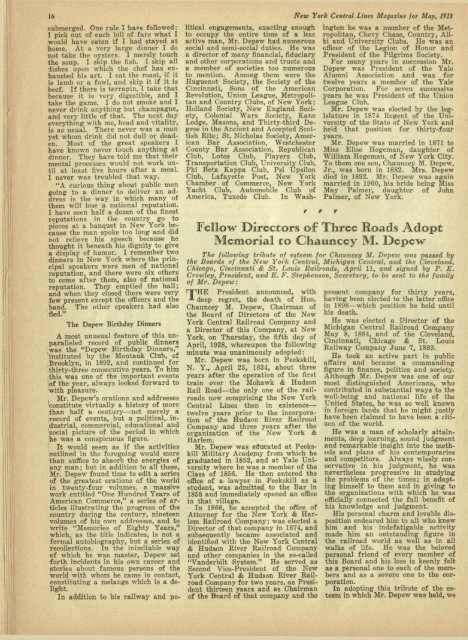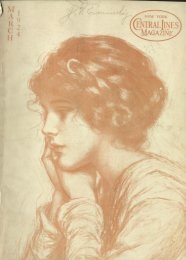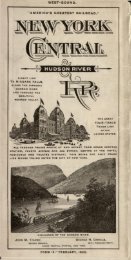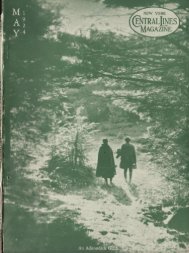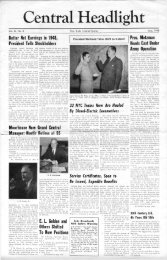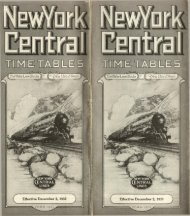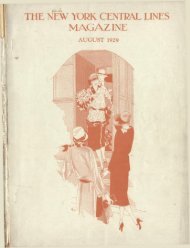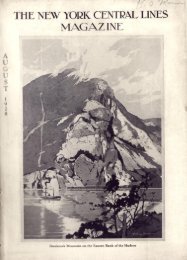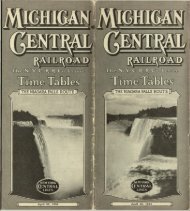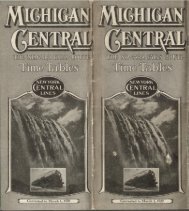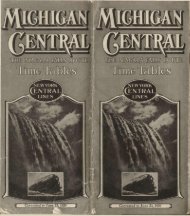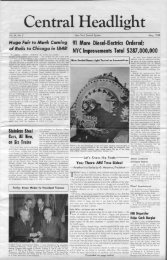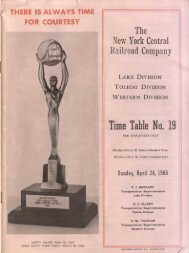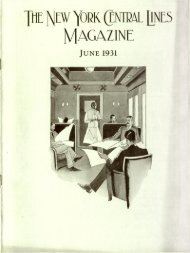You also want an ePaper? Increase the reach of your titles
YUMPU automatically turns print PDFs into web optimized ePapers that Google loves.
16 New York Central Lines Magazine for May, 1928<br />
submerged. One rule I have followed:<br />
I pick out of each bill of fare what I<br />
would have eaten if I had stayed at<br />
home. At a very large dinner I do<br />
not take the oysters. I merely touch<br />
the soup. I skip the fish. I skip all<br />
dishes upon which the chef has exhausted<br />
his art. I eat the roast, if it<br />
is lamb or a fowl, and skip it if it is<br />
beef. If there is terrapin, I take that<br />
because it is very digestible, and I<br />
take the game. I do not smoke and I<br />
never drink anything but champagne,<br />
and very little of that. The next day<br />
everything with me, head and vitality,<br />
is as usual. There never was a man<br />
yet whom drink did not dull or deaden.<br />
Most of the great speakers I<br />
have known never touch anything at<br />
dinner. They have told me that their<br />
mental processes would not work until<br />
at least five hours after a meal.<br />
I never was troubled that way.<br />
"A curious thing about public men<br />
going to a dinner to deliver an address<br />
is the way in which many of<br />
them will lose a national reputation.<br />
I have seen half a dozen of the finest<br />
reputations in the country go to<br />
pieces at a banquet in New York because<br />
the man spoke too long and did<br />
not relieve his speech because he<br />
thought it beneath his dignity to give<br />
a display of humor. I remember two<br />
dinners in New York where the principal<br />
speakers were men of national<br />
reputation, and there were six others<br />
to come after them, also of national<br />
reputation. They emptied the hall;<br />
and when they closed there were very<br />
few present except the officers and the<br />
band. The other speakers had also<br />
fled."<br />
The Depew Birthday Dinners<br />
A most unusual feature of this unparalleled<br />
record of public dinners<br />
was the "Depew Birthday Dinners,"<br />
instituted by the Montauk Club, of<br />
Brooklyn, in 1892, and continued for<br />
ithirty-three consecutive years. To him<br />
this was one of the important events<br />
of the year, always looked forward to<br />
with pleasure.<br />
Mr. Depew's orations and addresses<br />
'constitute virtually a history of more<br />
than half a century—not merely _ a<br />
•record of events, but a political,, industrial,<br />
commercial, educational and<br />
social picture of the period in which<br />
he was a conspicuous figure.<br />
It would seem as if the activities<br />
outlined in the foregoing would more<br />
than suffice to absorb the energies of<br />
any man; but in addition to all these,<br />
Mr. Depew found time to edit a series<br />
of the greatest orations of the world<br />
in twenty-four volumes, a massive<br />
work entitled "One Hundred Years of<br />
American Commerce," a series of articles<br />
illustrating the progress of the<br />
country during the century, nineteen<br />
volumes of his own addresses, and to<br />
write "Memories of Eighty Years,"<br />
which, as the title indicates, is not a<br />
formal autobiography, but a series of<br />
recollections. In the inimitable way<br />
of which he was master, Depew set<br />
forth incidents in his own career and<br />
stories about famous persons of the<br />
world with whom he came in contact,<br />
constituting a melange which is a delight.<br />
In addition to his railway and po<br />
litical engagements, exacting enough<br />
to occupy the entire time of a less<br />
active man, Mr. Depew had numerous<br />
social and semi-social duties. He was<br />
a director of many financial, fiduciary<br />
and other corporations and trusts and<br />
a member of societies too numerous<br />
to mention. Among them were the<br />
Huguenot Society, the Society of the<br />
Cincinnati, Sons of the American<br />
Revolution, Union League, Metropolitan<br />
and Country Clubs, of New York;<br />
Holland Society, New England Society,<br />
Colonial Wars Society, Kane<br />
Lodge, Masons, and Thirty-third Degree<br />
in the Ancient and Accepted Scottish<br />
Rite; St. Nicholas Society, American<br />
Bar Association, Westchester<br />
County Bar Association, Republican<br />
Club, Lotos Club, Players Club,<br />
Transportation Club, University Club,<br />
Phi Beta Kappa Club, Psi Upsilon<br />
Club, Lafayette Post, New York<br />
Chamber of Commerce, New York<br />
Yacht Club, Automobile Club of<br />
America, Tuxedo Club. In Wash<br />
ington he was a member of the Metropolitan,<br />
Chevy Chase, Country, Alibi<br />
and University Clubs. He was an<br />
officer of the Legion of Honor and<br />
President of the Pilgrims Society.<br />
For many years in succession Mr.<br />
Depew was President of the Yale<br />
Alumni Association and was for<br />
twelve years a member of the Yale<br />
Corporation. For seven successive<br />
years he was President of the Union<br />
League Club.<br />
Mr. Depew was elected by the legislature<br />
in 1874 Regent of the University<br />
of the State of New York and<br />
held that position for thirty-four<br />
years.<br />
Mr. Depew was married in 1871 to<br />
Miss Elise Hegeman, daughter of<br />
William Hegeman, of New York City.<br />
To them one son, Chauncey M. Depew,<br />
Jr., was born in 1882. Mrs. Depew<br />
died in 1892. Mr. Depew was again<br />
married in 1900, his bride being Miss<br />
May Palmer, daughter of John<br />
Palmer, of New York.<br />
F e l l o w Directors o f T h r e e R o a d s<br />
M e m o r i a l to C h a u n c e y D e p e w<br />
The following tribute of esteem for Chauncey M. Depew was passed by<br />
the Boards of the New York Central, Michigan Central, and the Cleveland,<br />
Chicago, Cincinnati & St. Louis Railroads, April 11, and signed by P. E.<br />
Crowley, President, and E. F. Stephenson, Secretary, to be sent to the family<br />
of Mr. Depew:<br />
HE President announced, with<br />
Tdeep regret, the death of Hon.<br />
Chauncey M. Depew, Chairman of<br />
the Board of Directors of the New<br />
York Central Railroad Company and<br />
a Director of this Company, at New<br />
York, on Thursday, the fifth day of<br />
April, 1928, whereupon the following<br />
minute was unanimously adopted:<br />
Mr. Depew was born in Peekskill,<br />
N. Y., April 23, 1834, about three<br />
years after the operation of the first<br />
train over the Mohawk & Hudson<br />
Rail Road—the only one of the railroads<br />
now comprising the New York<br />
Central Lines then in existence—<br />
twelve years prior to the incorporation<br />
of the Hudson River Railroad<br />
Company and three years after the<br />
organization of the New York &<br />
Harlem.<br />
Mr. Depew was educated at Peekskill<br />
Military Academy from which he<br />
graduated in 1852, and at Yale University<br />
where he was a member of the<br />
Class of 1856. He then entered the<br />
office of a lawyer in Peekskill as a<br />
student, was admitted, to the Bar in<br />
1858 and immediately opened an office<br />
in that village.<br />
In 1866, he accepted the office of<br />
Attorney for the New York & Harlem<br />
Railroad Company; was elected a<br />
Director of that company in 1874, and<br />
subsequently became associated and<br />
identified with the New York Central<br />
& Hudson River Railroad Company<br />
and other companies in the so-called<br />
"Vanderbilt System." He served as<br />
Second Vice-President of the New<br />
York Central & Hudson River Railroad<br />
Company for two years, as President<br />
thirteen years and as Chairman<br />
of the Board of that company and the<br />
present company for thirty years,<br />
having been elected to the latter office<br />
in 1898—which position he held until<br />
his death.<br />
He was elected a Director of the<br />
Michigan Central Railroad Company<br />
May 8, 1884, and of the Cleveland,<br />
Cincinnati, Chicago & St. Louis<br />
<strong>Railway</strong> Company June 7, 1889.<br />
He took an active part in public<br />
affairs and became a commanding<br />
figure in finance, politics and society.<br />
Although Mr. Depew was one of our<br />
most distinguished Americans, who<br />
contributed in substantial ways to the<br />
well-being and national life of the<br />
United States, he was so well known<br />
in foreign lands that he might justly<br />
have been claimed to have been a citizen<br />
of the world.<br />
He was a man of scholarly attainments,<br />
deep learning, sound judgment<br />
and remarkable insight into the methods<br />
and plans of his contemporaries<br />
and competitors. Always wisely conservative<br />
in his judgment, he was<br />
nevertheless progressive in studying<br />
the problems of the times; in adapting<br />
himself to them and in giving to<br />
the organizations with which he was<br />
officially connected the full benefit of<br />
his knowledge and judgment.<br />
His personal charm and lovable disposition<br />
endeared him to all who knew<br />
him and his indefatigable activity<br />
made him an outstanding figure in<br />
the railroad world as well as in all<br />
walks of life. He was the beloved<br />
personal friend of every member of<br />
this Board and his loss is keenly felt<br />
as a personal one to each of the members<br />
and as a severe one to the corporation.<br />
In adopting this tribute of the esteem<br />
in which Mr. Depew was held, we<br />
New York Central Lines Magazine for May, 1928 17<br />
One Seeks Kest in Peekskill<br />
By Garnett Laidlaw Eskew<br />
1DACK to the valley that he loved so long<br />
The patriarch returns to seek his rest . . .<br />
April is here, the birds break into song,<br />
The same blue hills roll out against the West,<br />
And the same river, sweeping grandly down,<br />
Laps as of old beside his quiet town.<br />
These are unchanged as when, long, long ago,<br />
Beyond the memory of our oldest men,<br />
He was a boy here by the Hudson's flow,<br />
Watching the world go forward, even then,<br />
With happy eyes, and that sure, simple faith<br />
Which was the staff on which he leaned till death.<br />
Four score and fourteen years had laid their weight<br />
Upon him, silvering all his hair with snow,<br />
Bending the once straight shoulders that of late<br />
Had borne no burdens which a man can know<br />
When he is in his prime—such as he bore<br />
Through the long years of life that went before.<br />
But with his soul untrammeled and unbent,<br />
Young to the last, he answers the last call,<br />
Turns from the marts where his best years were spent-<br />
Where traffic roars through vault and echoing hall—<br />
And seeks once more his peaceful boyhood town<br />
Close by the Hudson, curving grandly down.<br />
all feel that his most enduring memorial<br />
is written in the hearts of those he<br />
loved so well and by whom that love<br />
was richly returned.<br />
Resolved: That this tribute be<br />
entered in our minutes and a copy,<br />
engrossed and executed, sent to his<br />
family.<br />
New York-Chicago Non-Excess<br />
Fare Service Further<br />
Improved<br />
"[FUR<strong>TH</strong>ER improvement in non-excess<br />
fare sleeping car service between<br />
Chicago and New York via the<br />
New York Central and New York<br />
Central-Michigan Central Railroads<br />
was announced with the change of<br />
time on April 29.<br />
The Chicago-New York non-excessfare<br />
sleeper via the New York Central<br />
leaving in No. 10, the Easterner, from<br />
LaSalle Street Station, daily at 10:35<br />
A.M., arriving in Buffalo at 1:30 A.M.,<br />
and the Chicago-New York non-excess<br />
fare sleeper via the Michigan Central<br />
in No. 10 of that road, from Central<br />
Station, Chicago, daily at 10:30 A.M.,<br />
now arrive in Buffalo at 1:30 A.M.<br />
Both cars are placed in the fast<br />
Prairie State, New York Central No.<br />
16, at Buffalo, leaving that point at<br />
4:20 A.M., and arriving at Grand<br />
Central Terminal at 3:37 P.M.<br />
It will be noted that these cars lay<br />
over during the night at Buffalo when<br />
passengers are asleep, and that all<br />
trains in which these cars move are<br />
express trains, making few stops.<br />
Body in Mausoleum<br />
at Peekskill, IN. Y.<br />
HE funeral coach, which bore<br />
TChauncey M. Depew on his last<br />
journey to his native village of Peekskill,<br />
N. Y., was followed by five motor<br />
cars, in which were members of the<br />
family only. Mrs. Depew was not<br />
strong enough to undertake the long<br />
journey, so she returned home.<br />
The cortege was escorted by a detachment<br />
of motorcycle police and followed<br />
by two big motor cars carrying<br />
reporters and photographers for the<br />
metropolitan press and the press associations.<br />
At the New York City line<br />
the motorcycle police were relieved by<br />
a similar detachment from the city of<br />
Yonkers, who in turn were relieved<br />
at the north line of Yonkers by a detachment<br />
of State police, which escorted<br />
the cortege to the limits of<br />
Peekskill. Here a detachment of<br />
seven motorcycle policemen of Peekskill<br />
relieved the State police and escorted<br />
the cortege to the cemetery.<br />
As the cortege passed through the<br />
various towns along the route of more<br />
than forty miles, bells were tolled and<br />
the streets were lined with people,<br />
who stood with bared heads as the<br />
cars passed.<br />
At the southern line of Peekskill<br />
an automobile carrying the Board of<br />
Village Trustees, Frederick W. Otte,<br />
President; Carl G. Pfeiffer, Thomas<br />
C. Gardiner, Martin Neilsson, Dr. A.<br />
E. Anderson, Dr. H. F. Hart and<br />
Charles E. Fisher, joined the cortege<br />
for the rest of the journey to Hillside<br />
Cemetery, which lies back in the hills<br />
about four miles from the New York<br />
Central station.<br />
President Otte of the Board of<br />
Trustees had requested all business<br />
houses along the route of the funeral<br />
procession to close for an hour during<br />
the last rites. There was a lavish<br />
display of flags at half mast, while<br />
the street along which the cortege<br />
passed was lined with old friends and<br />
neighbors, who stood silently with<br />
heads bared.<br />
The cortege passed within sight of<br />
the old Depew home and on to the old<br />
cemetery dating back to early Colonial<br />
times, in which old St. Peter's church,<br />
built long before the revolution, where<br />
Washington is said to have worshipped,<br />
and at last to the new cemetery.<br />
On a little knoll on the hillside<br />
stands the beautifully simple, dignified<br />
mausoleum which Mr. Depew had<br />
had built. The lawn in front was<br />
carpeted with cut flowers. On this<br />
carpet the casket was deposited while<br />
the Reverend Dr. Brooks read the<br />
brief service committing the body to<br />
the tomb, while a detachment of boys<br />
in uniform from Peekskill Military<br />
Academy, where Mr. Depew had received<br />
his schooling, stood at attention<br />
and a group of fellow townsmen<br />
bowed reverent heads.<br />
On the following day, Easter Sunday,<br />
memorial services were held in<br />
the Peekskill churches for the village's<br />
most distinguished citizen.


